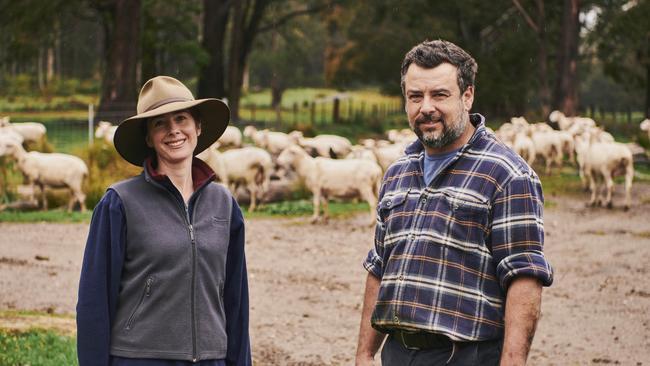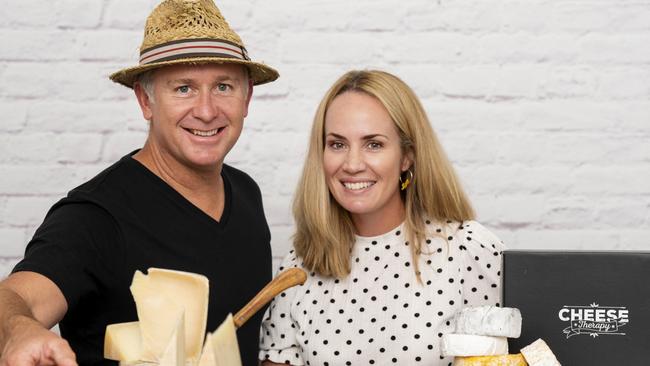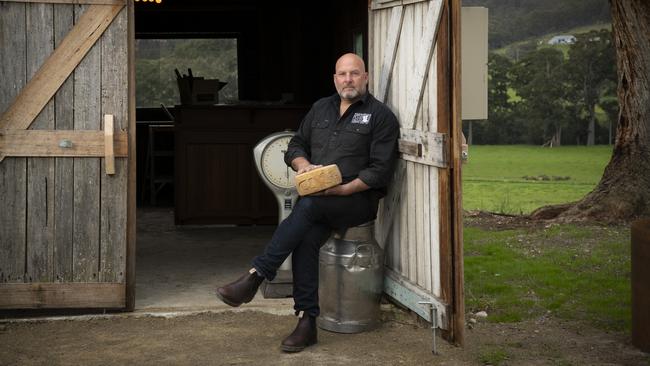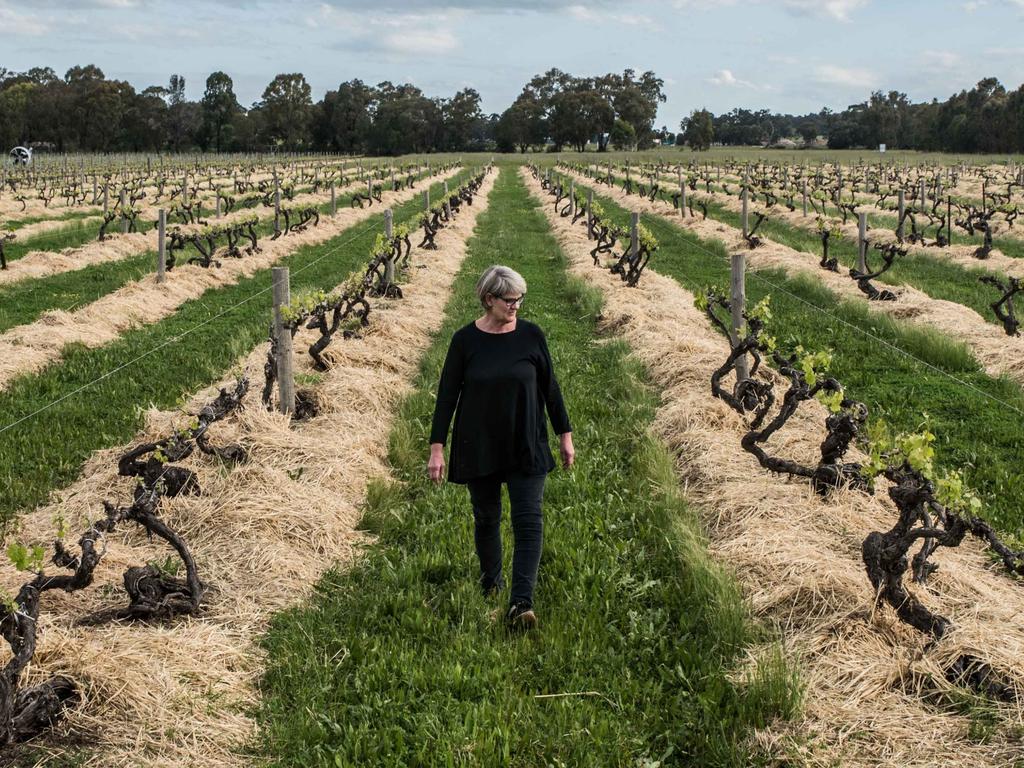Say cheese: artisan producers savour online boom
Specialty cheeses are flying off the shelves to all corners of the country. For our producers, the time is ripe | TOP 100 WINES

Cloncurry is about halfway between Brisbane and Darwin, miles from nowhere. Rose and Dale Saunders, with their extended family, farm about 8000 cattle on their 80,000ha of dry, rugged country. “We like to treat ourselves at night with a cold beer and a nice bit of cheese and biscuits,” says Rose, a mother of three, but “you can’t really get anything in Cloncurry.” What they eat depends on what’s in the box when it’s delivered – and they are discerning treats. It might be a brie-style white mould made by a Frenchman in Victoria’s Western District, or a raw sheep milk feta from the NSW Southern Highlands.
All this year, the Saunders have been ordering a curated monthly cheese selection that arrives by courier in specially designed packaging. They’re not the only ones. In a good month, like August, one specialty cheese hamper company is sending about 30,000 such boxes to most corners of the country. And that’s just one business.
THE LIST: JAMES HALLIDAY’S TOP 100 WINES OF 2020
THE LIST: PETER LALOR’S TOP 20 BEERS OF 2020
It’s difficult to find winners in a hospitality industry ravaged by Covid but cheese generally and Australian cheese in particular has been thrown a lifeline by innovative online retailing and what is generally agreed to be a coming-of-age at the quality end of Australian cheese.
For a home delivery cheese hamper company such as Sunshine Coast-based Cheese Therapy, the twin catastrophes of last summer’s bushfires and Covid-19 have generated spectacular demand: sales in August 2020 alone were three times the company’s entire 2019 turnover; as many as 1200 boxes a day are leaving its two warehouses in Geelong and Brisbane, equating to around 8000 tonnes of cheese a month.

For owners Sam Penny and Helen Shadforth, the idea of curated, home-delivered cheese boxes, either Australian or imported, took hold in March 2016. Penny, in particular, is an ideas man. He invented the circulation booster for feet you see Dawn Fraser and actor Ray Meagher spruik on television before selling the company. And outside his entrepreneurial appetite, he was the first man to attempt to swim the English Channel in winter (abandoned after three hours, but he’d swum it before in summer 2018).
“We thought we’d just fly in some French cheese, create a kind of club with our friends,” says Penny of Cheese Therapy’s inception, “and that was the extent of our market research.” But 2020 has seen sales on a completely new trajectory, and mostly it’s been Australian cheese from small producers that has made the company the third-largest cheese retailer in the country, according to Penny, behind Coles and Woolies.
Cheese Therapy is supplied by 17 Australian producers from the eastern states and South Australia and he reckons turnover will hit $1 million a month by Christmas. Marketing, packaging and logistics have all played a part (it partnered with a company that specialises in human organ delivery, for example) but a powerful consumer desire to support small rural Australian producers has been a major part of the success.

Those producers include Pecora Dairy, a property in the NSW Southern Highlands, where Michael and Cressida Cains have established themselves over the past decade at the pinnacle of Australian sheep milk cheesemaking – indeed, among specialty cheese royalty in this country full stop. The farmers/cheesemakers, with their flock of rare pure East Friesians, make the kind of cheese the country’s best chefs keep in their coolrooms. But with half of their production going into restaurants and food-service, they were a classic example of the kind of specialist rural food business that the pandemic threatened to dismantle.
“When Covid hit it was a real shock to the system,” says Michael, a one-time property manager. “About 50 per cent of our business evaporated overnight.” Adding to the couple’s woes, they’d just opened a tourist-focused farmgate shop in nearby Robertson. A quick pivot to online sales and delivery helped take up immediate slack. “It had tremendous support,” he says. Consumers quickly developed a serious appetite for home delivery of many things, including cheese.
Pecora’s revenue is now up 30 per cent on 2019 over two consecutive quarters; online sales via Cheese Therapy and another online initiative, Mould Collective, have contributed massively. But more fundamentally, a confluence of many factors has led to the fortunate position Pecora finds itself in. According to Dairy Australia figures, imports of specialty cheese to Australia increased from 65,000 tonnes to 105,000 tonnes in the decade to 2019. “Demand for good cheese has really taken off,” Cains says. “But right now it can’t be met by European imports.” He believes Covid and the shift in paths to market comes at a time in Australia’s history when “we are really starting to produce not just great cheese but a diverse range of great cheeses”.
Cains says 2020 will be a pivotal year for Australian specialty cheese, “a turning of the corner” that he likens to the beer fridge in the local bottle shop. “The independent Australian craft beer scene means that what you see today is unrecognisable compared to 10 years ago.”
And finally, raw milk cheeses are emerging from a regulatory morass. Pecora produces one – its feta – as do Section 28, Prom Country and Bruny Island. “Suddenly we have numerous really good restaurants saying, ‘What business have we got putting an imported cheese on the menu of an Australian restaurant?’” says Cains. Another part of the matrix is the opening of a “serious” cheesemaking school in Castlemaine, Victoria, that he reckons will turbocharge the small-scale, quality end of the industry.
Over in Gippsland, Victoria, David Johnson’s Tarago River produces one of the country’s best blue cheeses from its own herd. Tarago was a classic cheesemaking business model: it farmed the cattle, made the cheese, sold some at the cellar door but the majority went to a wholesale distributor who, in turn, sold it to restaurants, delicatessens and the first-class caterers of a few major airlines.
When Covid hit, Johnson was left holding two tonnes of cheese that normally went to the airlines. Cheese Therapy has more than absorbed the slack. “We actually went from a glut to not having enough cheese,” Johnson says; his sales were up 20 per cent in June over the previous year, after taking an initial 40 per cent hit in April. He’s taken on more staff for the current financial year. “They [Cheese Therapy] opened up a market that they didn’t really know was there. All of a sudden consumers decided to go down the Australian route.”

Down in Tasmania, Bruny Island Cheese’s Nick Haddow says European cheese has been hard to get and very expensive in 2020, “so it’s forced a lot of chefs to look for locally produced substitutes. Chefs who bang on about using local produce have really had to walk the walk.” In the past six months his online sales have doubled those of the same period last year.
“It’s been terrific,” says Haddow. “As a small producer in an isolated location, it’s been a great way to tell our story, for people to connect to our place. The really interesting thing to ask at the end of all this will be, ‘What have we learnt from it?’”
Maybe the answer lies in diversification. Apart from making cheese, running a dairy and producing ale, Haddow has a finger in another pie, Mould Collective. Previously an events firm built around small cheesemakers, it quickly pivoted to retail with an emphasis on education. It’s another way for consumers around the country to access rare cheeses.

Run out of Melbourne by Dan Sims, Mould Collective is more a club – with online content including a podcast, subscriber deals and video education/tasting sessions – than a strict retailer. Nevertheless, says Sims, it has kept five employees busy since March. The first curated box went out in May; it is now selling about 1500 a month. “It doesn’t replace the events, but it’s enabled us to hold on,” he says. “My aim is to be fiscally independent of JobKeeper, and we’re about 50 per cent there.”

Melbourne cheesemonger Olivia Sutton says her business would have collapsed were it not for a surge in online sales/deliveries. She set up Harper & Blohm five years ago with a minor online component. “Customers used the website more as a catalogue,” she says. “Our model was very much over-the-counter tastings and sales. Click-and-collect was never a big thing either.” The physical shop closed to customers in March but the online trade has since doubled.
But the most gratifying aspect of the 2020 shift to online has been what she describes as a “massive” swing to Australian cheese sales. She says her pre-Covid split in favour of imports over domestic cheeses was about 70/30. Now it’s running at 50/50, which she says is surprising given the retail prices of high-end Australian cheese – which, unlike EU products, is not subsidised. “There’s been a huge change in the psyche of what people want to buy,” Sutton says. “Customers really want to support local.”





To join the conversation, please log in. Don't have an account? Register
Join the conversation, you are commenting as Logout